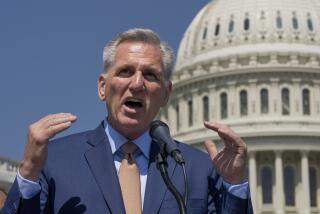Slump Forcing U.S. to Borrow
WASHINGTON — The economic slowdown, along with rebate checks for President Bush’s tax cut, will force the government to borrow $51 billion by September, an about-face from its previous predictions, the Treasury Department said Monday.
Treasury officials said Washington expects to be a net borrower of $51 billion during this quarter. The department had said earlier it would pay back $57 billion during those months, for a swing of $108 billion.
Officials said $38 billion of the borrowed money would pay for tax rebates Americans have begun receiving, money that officials hope will fuel more spending and help the economy avoid recession.
The new borrowing will be the largest since the Treasury Department borrowed $77.2 billion in the January-through-March quarter of 1996. It will be a sharp turnabout from the immediate past quarter, when Washington paid off a whopping $163 billion of debt.
The Treasury Department’s disclosure of the new borrowing is another suggestion that the era of the big budget surpluses is coming to a close as the combination of the tax cut and the economic slowdown takes its toll.
Some victims already have been claimed. A second round of tax cuts, with provisions ranging from repeal of the steep federal liquor tax to generous tax breaks for the charitable works of faith-based institutions, seems increasingly unlikely this year.
On the spending side of the budget, Congress will have to scrape to come up with the funds for Bush’s favored programs, notably defense and education.
Mitchell Daniels, the Bush administration’s budget chief, predicted this month that the government’s surplus for the fiscal year that ends in September would be $160 billion to $190 billion. Either figure, though substantially less than the $275 billion that had been forecast by the Congressional Budget Office this year, would have seemed an unimaginable windfall even a few years ago.
But the tax-cut measure, which the president signed into law June 7, will reduce the amount Washington collects and keeps by $1.35 trillion over the next 10 years, including the $38 billion in rebates over the next three months.
“The tax bill included rebates because we wanted to stimulate the economy,” Treasury spokeswoman Michele A. Davis said. “People are getting money now instead of next year when they file their income taxes.”
The tax bill also moved the due date for corporate tax payments out of the current fiscal year, which ends Sept. 30, and into the next one. About $28 billion of the latest borrowing will be needed to cover that shift.
And up to $8 billion will go for spending Congress approved that is beyond its normal budget.
That still leaves about $34 billion of the $108-billion shift unaccounted for. Analysts said a substantial portion was due to lower tax collections caused by the economic slowdown.
The $51-billion borrowing will not be the first time Washington has had to take out a loan since it began running budget surpluses in 1998. It borrowed $46 billion in the first quarter of this year, according to Treasury figures.
Both individual and corporate tax receipts are down from a year ago. For example, individual income tax collections in June were $93.7 billion, down from $100.5 billion a year ago. Corporate tax collections in June were $29.9 billion, down from $40.5 billion.
Analysts attribute declines in both types of taxes to the slowing economy. The government announced Friday that the economy grew at an anemic 0.7% annual rate in the April-through-June quarter, down from a 1.3% pace the previous quarter and the 4%-plus rates of the preceding four years.
Even with the slower growth, however, Washington still expects to post a fourth consecutive annual surplus and to continue to pay down the $3 trillion in debt held by the public.
(BEGIN TEXT OF INFOBOX / INFOGRAPHIC)
Ups and Downs
The Treasury has been able to pay back some of its debt in some recent quarters; in others, it has had to borrow more. In the graph, positive bars represent paybacks and negative bars stand for net borrowing.
July-Sept. estimate: -$51 billion
Source: U.S. Treasury Department
More to Read
Inside the business of entertainment
The Wide Shot brings you news, analysis and insights on everything from streaming wars to production — and what it all means for the future.
You may occasionally receive promotional content from the Los Angeles Times.










